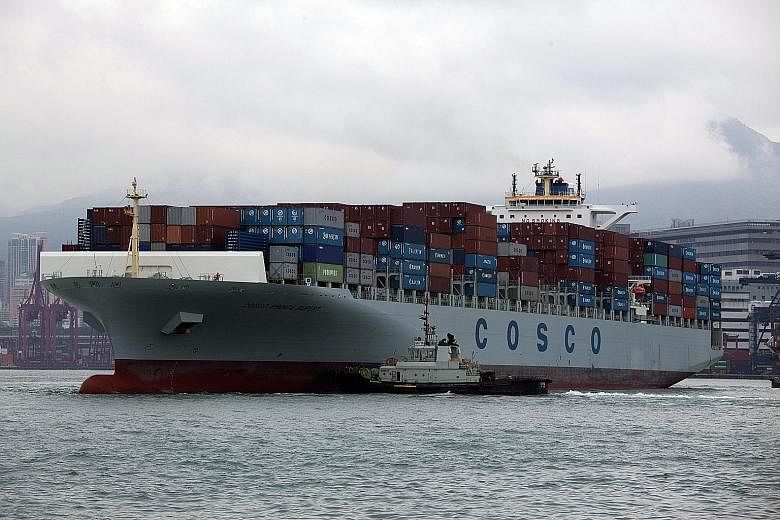The gigantic ambition of China's Cosco Shipping Holdings - underscored by its massive US$6.3 billion (S$8.7 billion) bid to buy smaller rival Orient Overseas International (OOIL) - is unlikely to affect the ports in Singapore in a significant way, said analysts.
Both container shipping companies already see Singapore as one of their main transshipment hubs for the region, noted Ocean Shipping Consultants director Jason Chiang.
Cosco has a stake in the Pasir Panjang Terminal through its joint venture with PSA, which is investing in three new container berths designed to handle mega container vessels.
"Both Cosco and OOIL are also part of the Ocean Alliance, which has directed most of its weekly calls to Singapore, especially after CMA CGM's acquisition of Neptune Orient Lines last year," said Mr Chiang.
State-owned Cosco said it will pay shareholders of Hong Kong's OOIL HK$78.67 (S$13.97) a share in cash for the acquisition - a 31 per cent premium over the stock's last closing price, according to exchange filings on Sunday.
The Tung family, which founded OOIL in 1969, has accepted the offer, which still needs regulatory approval and consent from Cosco's investors.
On completion of the deal, Cosco will hold 90.1 per cent of OOIL, while Shanghai International Port will have a 9.9 per cent stake. The buyers added that they plan to keep the shares of OOIL listed after the closing of the offer, and will retain all employees and their benefits.
-
90.1%
Cosco's share of OOIL on completion of the deal.
9.9%
Shanghai International Port's stake.
The move would also catapult the mainland Chinese group to become the world's No.3 shipping line, surpassing France's CMA CGM while closing the capacity gap with top players Maersk Line and Mediterranean Shipping.
While the deal will likely see Beijing take a firmer hold of Hong Kong's transport hub, Mr Chiang believes that Singapore will still retain its status as an important shipping hub for South-east Asia.
"Each has different hinterlands, and each serves its own regions. Hong Kong competes more with Shenzhen as the North Asia hub, while Singapore competes with Malaysia in South-east Asia," he said.
The bigger issue would be for the port operators, which now face the prospect of declining margins as consolidation continues to play out in the industry.
Already, the unprecedented wave of mergers and acquisitions that took place last year, coupled with the demise of South Korea's Hanjin Shipping, has left the top six shipping lines controlling 63 per cent of the market.
"There are fewer and fewer players to deal with, which means that the shipping lines have more leverage at the negotiating table as compared with the terminal operators. It will be harder for everyone, not just PSA," said an industry watcher, who declined to be named.
Mr Tan Hua Joo, executive consultant at Alphaliner, agreed that the consolidation of the main carriers will mainly impact their bargaining power in relation to port operators.
"However, the larger challenge for Singapore will still come from its closest competitors, namely Port Klang and Tanjung Pelepas in Malaysia, as well as from emerging ports in the region that are gradually bypassing the need to transship containers at hub ports in the region," said Mr Tan, citing Jakarta, Laem Chabang (Thailand), Cai Mep (Vietnam), and the upcoming Lach Huyen port in North Vietnam.
And the industry may not be done with consolidation yet.
"The next target is likely to be Pacific International Lines (PIL)," said Mr Tan, noting that the firm is set to become the world's ninth largest container shipping company, up from 12th now, after all of the current consolidation moves are completed.
"However, with a market share of only 1.8 per cent, PIL lacks the scale to compete effectively against its larger competitors. It could seek to capitalise on a recovery in the container shipping markets to make an exit."


